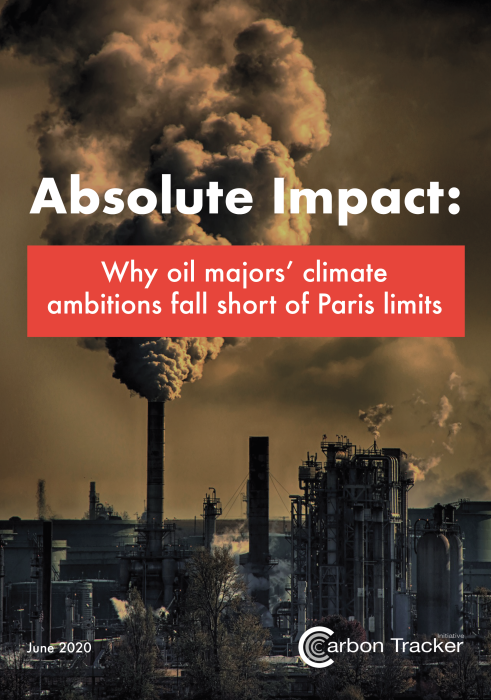The report highlights that net-zero goals alone are not enough to achieve the climate targets set by the Paris Agreement. It insists that oil and gas companies must reduce absolute emissions and establish credible action plans. The report also cautions against dependence solely on emissions mitigation technologies. Furthermore, it introduces a ranking system for assessing companies’ emissions reduction targets. It emphasizes that divesting from assets should not be used as an excuse to continue investing in new fossil fuel assets. Absolute Impact: Why oil majors’ climate ambitions fall short of Paris limits
Overview
Key Findings
Underscores the necessity for oil and gas firms to recognize the energy transition’s impact on their business model and investments. Ignoring these limits and approving environmentally unsustainable projects could result in stranded assets and reduced shareholder value. Therefore, aligning climate goals with a low-carbon economy is vital to minimize financial risks and ensure sustainable operations for a greener future.
Executive Summary
Emphasizes the oil and gas industry’s recognition of consumption changes needed to meet global carbon and Paris Agreement targets. It introduces the “Hallmarks of Paris Compliance” framework for ranking industry climate goals, leading to a competitive European race with numerous ambitious pledges. It stresses the need for climate goal alignment with the global carbon budget for effective transition risk management and sustainable finance in a low-carbon economy.
Introduction
Discusses the implications of “net zero” commitments and the urgent need for oil and gas producers to align with climate goals. It emphasizes the accelerated need for adaptation due to reduced demand from factors like COVID-19 and the shift towards electricity generation and distribution. It underscores addressing climate risks in the sector.
Net zero and the implications for the planet
Highlights the urgent need to achieve net zero emissions to curb the rise in global temperature. Additionally, it emphasizes the critical importance of a finite carbon budget and the necessity of making significant emissions reductions to mitigate the impacts of climate change. Ultimately, it underscores the essential transition to a net zero scenario for a sustainable planetary future.
Impact for oil and gas producers
Companies must consider the energy transition’s impact on their models and investments, as ignoring the low-carbon economy could risk stranded assets and decreased shareholder value. The report urges alignment with changing energy demands and sustainable practices. It highlights the need for strategic adaptations to mitigate transition risks in a swiftly decarbonizing world effectively.
Climate Targets at the Company Level
Assesses the oil and gas industry’s climate targets and methodologies. It discusses the framework for Paris Compliance and aligning company goals with the carbon budget. It ranks companies by climate ambition and emphasizes the need for absolute emissions reductions, including scope 3. Also, analyzes the alignment of climate targets with global goals and the financial risks of energy transition.
Review of key elements of company approaches
Considers oil and gas firms’ climate strategies, stressing the necessity for targets aligned with the carbon budget, such as decreasing production intensity, transitioning to gas, and adopting low-carbon energy. It highlights the importance of absolute emissions reduction, including scopes 1 and 2, and aligning goals with the global carbon budget. The report concludes with an analysis of approaches, alignment with climate goals, and the financial risks of energy transition.
The scale of ambitions
Underlines the need for oil and gas companies to set ambitious climate goals, including interim targets. It discusses the importance of the emissions pathway to net zero for climate outcomes, discrepancies in companies’ climate metrics, and their impact on emissions reduction strategies. It stresses the importance of structured targets that align with the carbon budget to cut greenhouse gas emissions effectively.
Comparison of company goals
Analyzes major oil and gas companies’ climate goals, comparing them with the global carbon budget and the Paris Agreement. It examines their ambitions and emission reduction targets, exploring strategies like intensity-based targets. It emphasizes the need for clear climate metric reporting and offers a comparative analysis of their climate goals’ effectiveness and alignment with transitioning to a low-carbon economy.
Conclusion
Urges oil and gas firms to set ambitious climate goals aligning with the Paris Agreement, including absolute emission reduction targets for scopes 1, 2, and 3. Interim targets are essential for timely action towards net zero emissions by 2050. It points out variations in company approaches to climate change, their impact on emissions reduction and calls for industry-standard reporting for transparency. The report emphasizes aligning strategies with climate goals for long-term sustainability.
Therefore. Nonetheless. However. Nevertheless. In conclusion. Henceforth. On the other hand. Hence. Furthermore.




